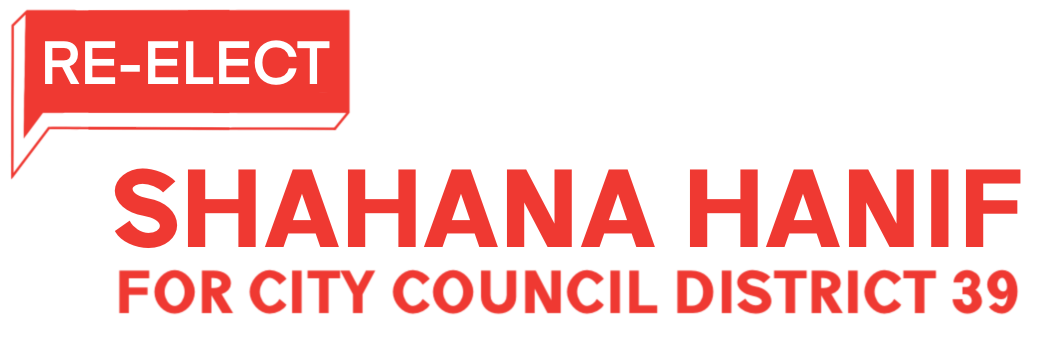DISABILITY JUSTICE
Shahana was politicized after her diagnosis with Lupus at 17. Instead of focusing on college applications and school play auditions, she was forced to navigate NYC’s unwieldy health care system, inaccessible transit system, and lack of medical translation and interpretation for her family. From crowdfunding hospital bills to being denied for Access-A-Ride, Shahana’s story is a familiar one to many New Yorkers who live with chronic illness and disabilities. People continue to be in pain because of the City’s inability to provide free healthcare, transit, and education. These experiences shaped Shahana’s advocacy, and disability justice is a lens through which Shahana views all policy: from community health, to worker protections, to reproductive justice.
In her early years with Lupus, Shahana became an advocate for disability justice and expanded care for people with disabilities, fighting for elevators at train stations and accommodations for students with disabilities at Brooklyn College. Shahana’s run for City Council represents a shift in our city’s political system, which largely prevents disabled people from leading. She is fighting for a City that prioritizes wellness, joy, and liberatory care.
As Councilmember, Shahana will work to:
+ Make our city's transportation truly public
- Advocate for expansion of the on-demand Access-a-Ride (AAR) pilot program to serve all AAR users and allow all users to request service whenever they need one, not 24 hours in advance.
- Work with the Department of Transportation to amend NYC Administrative Code 19-188 to require accessible pedestrian signals at all intersections in New York, such as crossing signals that provide auditory “walk” alerts. Currently, more than 95 percent of New York City’s intersections are in violation of the Americans with Disabilities Act (ADA).
- Work with state partners to demand the MTA create a fully accessible subway system, including installation, repair and maintenance of elevators across the subway system.
- Support changes in city zoning, like the Transit Easement Certification, which will make it easier for the MTA to add elevators and other station access improvements on developments next to subway stations.
- Make parks and open spaces more accessible to people with disabilities, by widening bike lanes and walkways, adding more ramps by staircases, and funding programs that teach folks with disabilities how to safely ride bikes.
+ Fight for accessible housing
- Partner with legal aid and disability-justice organizations to host workshops on housing rights of tenants with disabilities.
- Fully fund affordable housing for adults with disabilities and chronic health conditions with on-site social workers and services. Expand supportive housing services to include political education and arts programming.
- Reopen Project Open House, the city’s program that provides accessibility modifications in homes of people with disabilities, like ramps, widened doorways, and stairlifts.
+ Fund inclusive public education
- Host language-accessible workshops for guardians to understand their rights and options when accessing accommodations and special education services for their students.
- Work with school administrations in the district to ensure guardians have translated documents, like Individualized Education Program (IEP), to better advocate for services for their students.
- Help students apply for testing accommodations for statewide and admissions tests (i.e. Regents exams) and provide support for students with disabilities to explore college and career opportunities.
- Hold the NYC School Construction Authority accountable to infrastructural upgrades so that all schools are physically accessible, per the ADA.
- Advocate to increase the State Education Department’s funding for support services for students with disabilities in the city’s K-12 and college campuses.
- Advocate for Assemblymember Robert Carroll’s Assembly Bill A8786A which calls for early detection dyslexia screenings for all elementary school students.
+ End criminalization of disabilities
- Remove the NYPD from schools, as students with disabilities are vulnerable to police brutality, suspensions, and discipline that removes students from school. Black and Latinx children with disabilities face the highest rate of school suspensions.
- Fund guidance counselors, social workers, and school nurses in schools to provide more support to special education students.
- End the criminalization of mental health by removing NYPD’s authorization to respond to mental health crises, and invest in peer-to-peer support programs led by individuals with mental illnesses.
+ Expand participatory democracy
- Advocate for extended early voting and accessibility at all voting locations, including adequate sign interpreters, signage, and entrances.
- Conduct an audit of physical accessibility of all courthouses and public service offices in NYC.
- Provide subsidies to cover the cost of admission for patrons with disabilities for a greater variety and diversity of museums, theatres, and other cultural institutions. Work with smaller institutions to create physically accessible spaces, from entrances, bathrooms, signage, and free audio guide devices.
- Make community boards more accessible - from ADA complaint venues to ensuring appointments of community members with disabilities.
